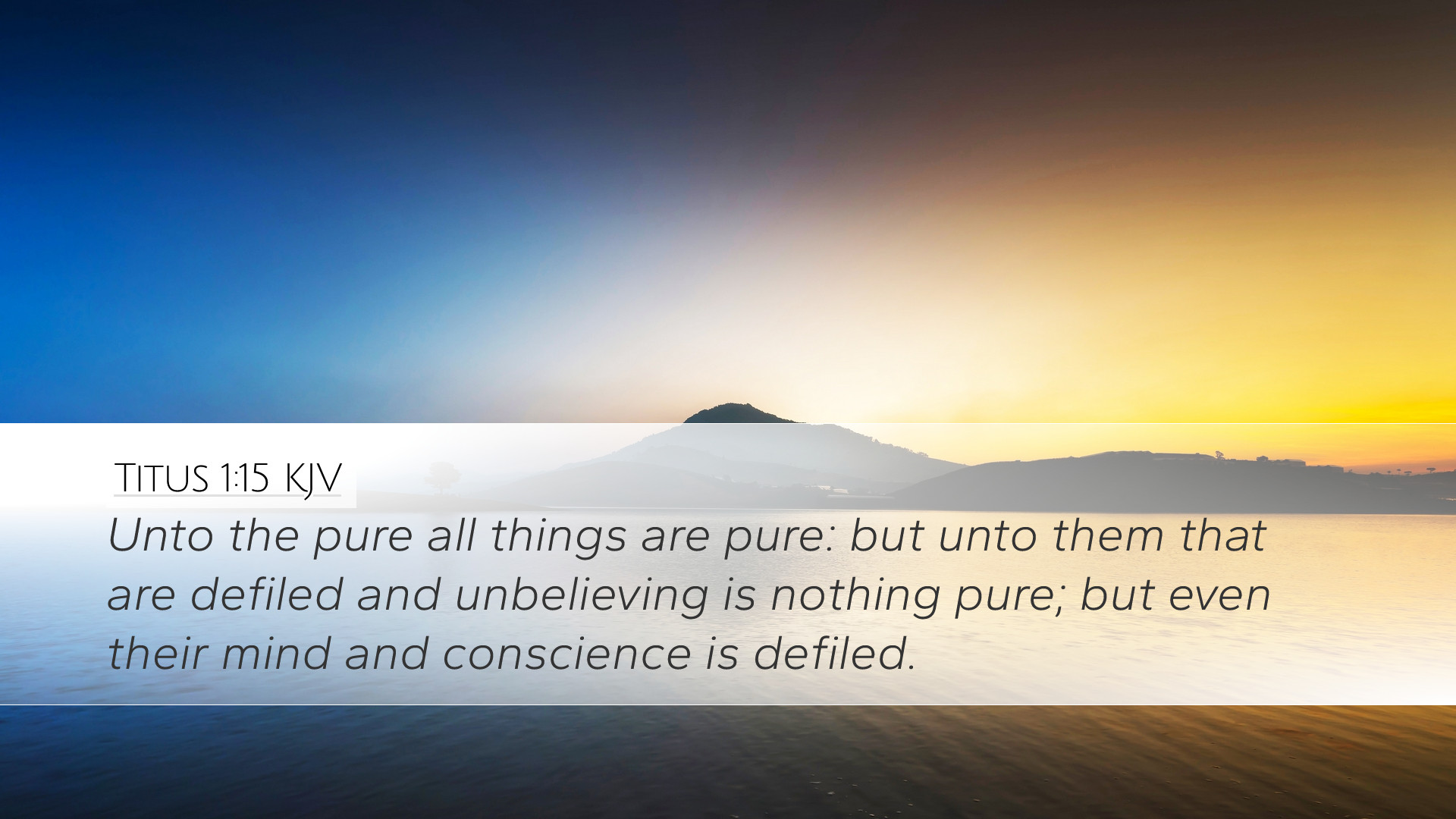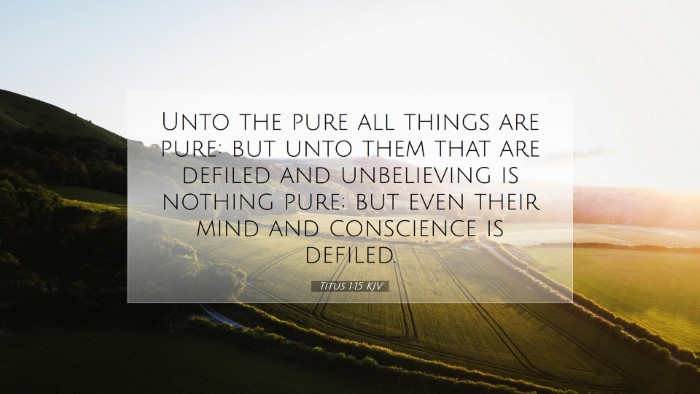Old Testament
Genesis Exodus Leviticus Numbers Deuteronomy Joshua Judges Ruth 1 Samuel 2 Samuel 1 Kings 2 Kings 1 Chronicles 2 Chronicles Ezra Nehemiah Esther Job Psalms Proverbs Ecclesiastes Song of Solomon Isaiah Jeremiah Lamentations Ezekiel Daniel Hosea Joel Amos Obadiah Jonah Micah Nahum Habakkuk Zephaniah Haggai Zechariah MalachiTitus 1:15
Titus 1:15 KJV
Unto the pure all things are pure: but unto them that are defiled and unbelieving is nothing pure; but even their mind and conscience is defiled.
Titus 1:15 Bible Commentary
Bible Commentary on Titus 1:15
Titus 1:15 (KJV): "Unto the pure all things are pure: but unto them that are defiled and unbelieving is nothing pure; but even their mind and conscience is defiled."
Introduction
This verse from the Apostle Paul’s letter to Titus provides profound insight into the nature of purity and its implications on one’s understanding and relationships. This commentary synthesizes thoughts from esteemed public domain commentaries including Matthew Henry, Albert Barnes, and Adam Clarke to elaborate on the theological and practical ramifications of this scripture for pastors, students, and scholars.
Exegesis of the Text
Contextual Background: The context of Titus 1:15 arises from Paul’s instructions concerning the qualifications of elders and the necessity of sound doctrine in the face of false teachings pervasive on the island of Crete. Here, Paul emphasizes the intrinsic link between purity and understanding.
Purity vs. Defilement: The verse contrasts two groups: the “pure” and the “defiled.” Matthew Henry notes that purity is not merely an external condition but rather an internal disposition of heart and mind. The interpretation underscores that for those who are pure in their conscience and faith, reality is perceived through a lens of holiness, allowing them to see goodness in all things.
In contrast, those who are “defiled and unbelieving” experience a world that seems filled with corruption. Their inability to see purity emanates from their tainted understanding and lack of faith. Adam Clarke emphasizes that defilement begins in the mind and extends to the conscience, leading to a cyclical deterioration of morality and perception. Therefore, the nature of one’s heart dictates the lens through which one views the world.
Theological Implications
1. The Nature of Purity: Albert Barnes reflects on the idea of purity as it relates to spiritual life. Purity, as outlined in this verse, can be understood as a wholeness or completeness in faith and morals. It suggests that a believer, seasoned in the understanding of God’s grace, embraces all of creation as good—each aspect reflecting God's character.
2. Impact of Unbelief: The assertion that “nothing is pure” for the defiled mind highlights the consequences of unbelief. Matthew Henry remarks that the disconnect between faith and perception fosters a worldview filled with skepticism and moral ambiguity. Unbelief clouds judgment and reinforces a cycle of despair and perpetual dissatisfaction.
Practical Applications
1. Encouragement for Believers: The assurance that “unto the pure all things are pure” serves as an encouragement for believers to cultivate a heart oriented toward God. This purity invites them into deeper fellowship with Christ where they can operate from a place of grace, seeing the world redeemed rather than cursed.
2. A Call to Iterate on Morality: Understanding that one’s perception of the world is largely dictated by their spiritual state calls for self-examination. Clarke asserts that churches and individuals must be vigilant against the “defiling” influences which often masquerade as acceptable norms. This demands sacrificial living and a commitment to scriptural truth.
- Reflection in Ministry:
Pastors must teach their congregations not merely to conform to external standards but to seek inner purity that transforms perception and behavior.
- Role of Accountability:
Believers should engage in community that fosters purity, accountability, and growth, as seen in the early church's commitment to each other’s spiritual well-being.
Conclusion
Titus 1:15 serves as a poignant reminder of the implications of purity and defilement on Christian living. This text invites introspection concerning the state of one’s moral and spiritual life, encouraging believers to pursue authentic purity in Christ. As elaborated by the public domain commentaries, understanding these dynamics not only enriches theological reflection but calls for tangible action within the faith community.


